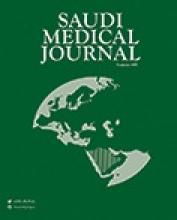Abstract
Objectives: To compare the mean total antioxidant status (TAS) among 3 glaucoma types, namely: pseudoexfoliation glaucoma (PEG), primary open angle glaucoma (POAG), and primary angle closure glaucoma (PACG), and study its potential association with various clinical glaucoma-parameters.
Methods: In this case-control study, plasma samples were obtained between September 2013 and October 2014 from 340 glaucoma patients (PEG [n=54]; POAG [n=147]; PACG [n=139]), and 351 controls of matching age, gender, ethnicity, and 5 different systemic co-morbidities from King Abdulaziz University Hospital, Riyadh, Saudi Arabia. The TAS in all samples was determined by a colorimetric-based assay.
Results: The mean±standard deviation of TAS was significantly lower among cases: 0.77±0.32 than controls: 1.1±0.22, p<0.0001. Moreover, the TAS levels were significantly different across the 3 types of glaucoma: 0.86±0.24 in PEG, 0.47±0.32 in POAG, and 0.98±0.41 in PACG (all p<0.0001). In addition, there was a significant correlation between TAS and age at onset (Pearson correlation coefficient [R] 0.17, p<0.0001), cup/disc ratio (R: -0.13, p=0.004), and number of anti-glaucoma medications (R: -0.16, p=0.001).
Conclusion: Our findings provide evidence that plasma TAS levels are decreased in patients with glaucoma, more so in POAG and PEG than PACG, supporting the hypothesis that decreased antioxidative defense and/or increased oxidative stress may have a critical role in the pathogenesis of glaucoma.
Footnotes
Disclosure. Authors have no conflict of interests, and the work was not supported or funded by any drug company. This study was supported by the Deanship of Scientific Research, Glaucoma Research Chair, Department of Ophthalmology, College of Medicine, King Saud University, Riyadh, Kingdom of Saudi Arabia.
- Received November 5, 2014.
- Accepted April 5, 2015.
- Copyright: © Saudi Medical Journal
This is an open-access article distributed under the terms of the Creative Commons Attribution-Noncommercial-Share Alike 3.0 Unported, which permits unrestricted use, distribution, and reproduction in any medium, provided the original work is properly cited.






